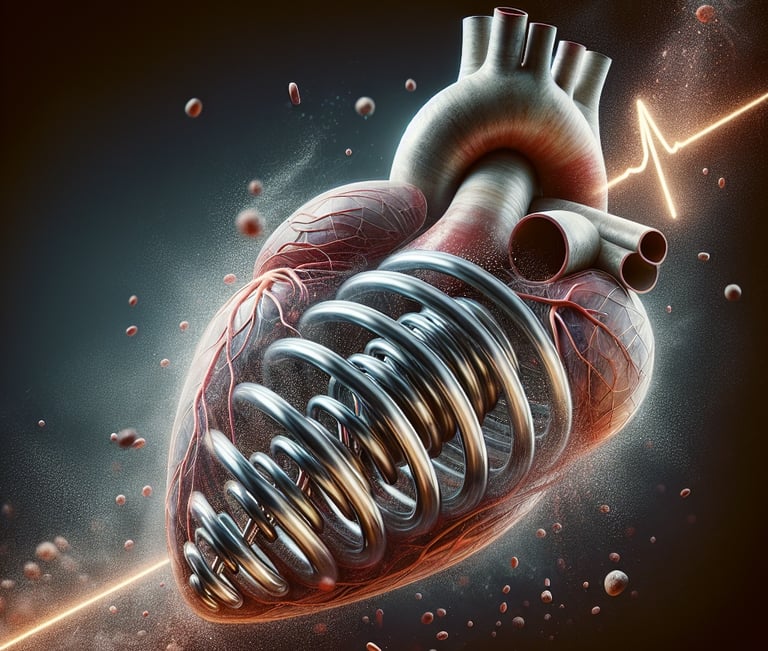Hypertension: Understanding High Blood Pressure and Its Risks
Learn about hypertension, its causes, and risks. Get advice on monitoring blood pressure, lifestyle changes, and treatment options to maintain heart health.
HEALTH AND FITNESS


Hypertension, or high blood pressure, is a pervasive health issue that affects millions of people worldwide. Often referred to as the "silent killer," it frequently goes unnoticed until it leads to serious health complications.
Hypertension is a major risk factor for cardiovascular diseases, including heart attack, stroke, and kidney failure. Understanding the nature of high blood pressure, its risks, and effective management strategies is crucial for maintaining long-term health. This article explores what hypertension is, its causes and effects, and provides practical tips for managing and reducing high blood pressure.
Learn more about managing and preventing hypertension by visiting the Mayo Clinic's comprehensive guide on high blood pressure
What Is Hypertension?
Hypertension is a condition where the force of the blood against the walls of the arteries is consistently too high. Blood pressure is measured in millimeters of mercury (mm Hg) and is expressed with two numbers: systolic pressure (the upper number) and diastolic pressure (the lower number).
Systolic Pressure: Measures the pressure in the arteries when the heart beats.
Diastolic Pressure: Measures the pressure in the arteries between heartbeats.
Blood pressure is classified as follows:
Normal: Less than 120/80 mm Hg
Elevated: 120-129/80 mm Hg
Hypertension Stage 1: 130-139/80-89 mm Hg
Hypertension Stage 2: 140 or higher/90 or higher mm Hg
Causes and Risk Factors of Hypertension
Hypertension can be classified into two main types: primary (essential) hypertension and secondary hypertension.
1. Primary (Essential) Hypertension
Primary hypertension develops gradually over time and has no identifiable cause. It is influenced by a combination of genetic, environmental, and lifestyle factors.
Genetic Factors: Family history of high blood pressure can increase your risk.
Age: Blood pressure tends to rise with age.
Lifestyle Factors: Unhealthy diet, lack of physical activity, excessive salt intake, and smoking can contribute to high blood pressure.
2. Secondary Hypertension
Secondary hypertension is caused by an underlying medical condition or use of certain medications.
Medical Conditions: Conditions such as chronic kidney disease, adrenal gland tumors, and hormonal disorders can cause secondary hypertension.
Medications: Certain medications, such as birth control pills, decongestants, and some over-the-counter pain relievers, can elevate blood pressure.
Risks and Complications of Hypertension
If left untreated, hypertension can lead to a range of serious health complications:
1. Cardiovascular Disease
Heart Attack: High blood pressure can damage the arteries, leading to the buildup of plaque and increasing the risk of heart attack.
Heart Failure: The heart may become weakened and less effective at pumping blood due to the increased workload from high blood pressure.
2. Stroke
Hypertension can cause the blood vessels in the brain to rupture or become blocked, leading to a stroke. Managing blood pressure is crucial to reducing this risk.
3. Kidney Damage
High blood pressure can damage the blood vessels in the kidneys, leading to chronic kidney disease or kidney failure.
4. Vision Loss
Hypertension can damage the blood vessels in the eyes, leading to vision problems or loss of vision.
Effective Management and Prevention Strategies
Managing hypertension effectively involves a combination of lifestyle changes, medical treatment, and regular monitoring. Here are some key strategies:
1. Lifestyle Modifications
Healthy Diet: Adopt a diet rich in fruits, vegetables, whole grains, and lean proteins. The DASH (Dietary Approaches to Stop Hypertension) diet is specifically designed to help lower blood pressure.
Reduce Salt Intake: Limit sodium consumption to less than 2,300 mg per day, or ideally 1,500 mg for those with high blood pressure.
Regular Exercise: Engage in at least 150 minutes of moderate-intensity aerobic exercise, such as walking or cycling, each week.
Limit Alcohol: Reduce alcohol consumption to moderate levels—up to one drink per day for women and two drinks per day for men.
Quit Smoking: Smoking contributes to high blood pressure and increases the risk of cardiovascular diseases.
2. Medical Treatment
Medications: Your healthcare provider may prescribe antihypertensive medications to help lower blood pressure. Common classes include diuretics, ACE inhibitors, angiotensin II receptor blockers (ARBs), and calcium channel blockers.
Regular Monitoring: Regularly monitor your blood pressure at home and during doctor visits to ensure it remains within the target range.
3. Stress Management
Relaxation Techniques: Practice stress-reducing activities such as meditation, deep breathing exercises, or yoga.
Adequate Sleep: Aim for 7-9 hours of quality sleep each night, as poor sleep can affect blood pressure.
Authority and Credibility
This article is based on information from reputable health organizations such as the American Heart Association (AHA) and the National Heart, Lung, and Blood Institute (NHLBI). These organizations provide evidence-based guidelines and recommendations for understanding and managing hypertension. For personalized medical advice and treatment, always consult a healthcare provider.
Conclusion: Taking Charge of Your Blood Pressure
Hypertension is a serious condition that requires proactive management to prevent complications and maintain overall health. By understanding the causes and risks associated with high blood pressure and adopting effective lifestyle changes, you can significantly reduce your risk and improve your well-being. Regular monitoring, medical treatment, and a commitment to a healthy lifestyle are key to managing hypertension successfully.
Managing hypertension involves a multifaceted approach, including lifestyle changes, medical treatment, and regular monitoring. By staying informed and proactive, you can effectively control high blood pressure and enhance your overall health.
